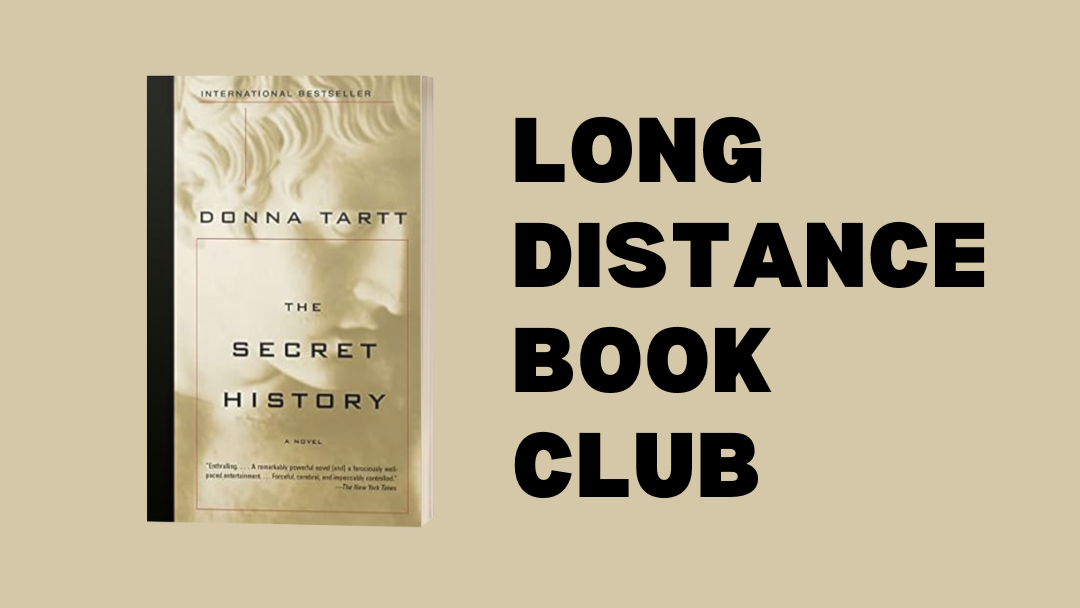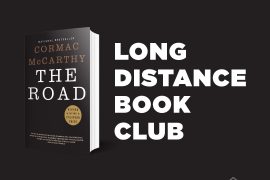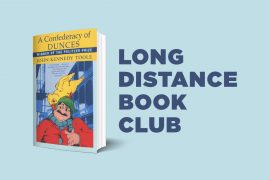Long Distance Book Club was created out of a desire to analyze works we admire with people we don’t often see in person. Using a Google document, a couple of friends discuss The Secret History by Donna Tartt over a couple of weeks.
We hope you enjoy.
Caleb Michael Sarvis (CMS): Before we get into what we liked or thought of this one, I’m curious. Did you know this book was published in 1992? Because I’d only just heard of it and figured it was a follow-up to The Goldfinch.
Justin Hall (JH): I didn’t know anything about it to be honest(true Justin fashion). I only knew people post about it a bit and I have picked it up several times to buy and have not because of how thick of a boy it is.
CMS: Yeah, same here. I kind of just stumbled upon it in the bookstore because when I like an author I seek out their work. Did you read The Goldfinch? Talk about thick boys.
JH: I didn’t but I did try to start it last year on audio and somehow got wildly distracted and never came back to it. I think it was the audio run time that made me put it off.
CMS: Highly recommend, though I think it requires a certain mood. Like … I’m just gonna live with this thing for a little while. Which, if you’re listening to it, that might not translate? Not sure. You may or may not know but I’ve never listened to an audio book.
JH: How is the air up there in your ivory tower 😉
CMS: Smells like book pages 🙂
What were your general impressions of the book?
JH: I just finished it. I felt it to be 300 pages or 10 hours too long.
So underwhelming. I am possibly swayed by justification otherwise?
CMS: I am flabbergasted. I didn’t want to leave this book. Could be the weather, but it was like comfort food to me.
I thought it was cozy and the pace was exactly what I like. Though, maybe I’m just a sucker for the genre? Dark academia set in the northeast? I’m usually always in. My big takeaway was it felt like a natural deterioration of the psyche. The tension between the guilt, the ages, the social relationships, it was delicious to me.
JH: I can agree with some of those feelings. But it was sooo much of those things and the book felt directionless. Also… it left the most insane part of the book completely unexplained and never recalled.
They did a ritual, killed a man and never went into that again. Other than to be on constant alert because Bunny was on to them.
CMS: Oh no, I felt the book had a very clear and foreboding direction, it was just a matter of how things were going to peak. I figured at least one of them would completely lose it, but the piece-by-piece ways Charles, Camilla, Francis, and Richard all fell apart, and the calm, controlled manner of Henry… woof the anxiety of it all kept me glued to the page.
As for the Bacchanal, I don’t think there was any way to explain that, especially since we were in Richard’s point of view. I’m happy not to know the full story because the details (mutilated body, drinking/drugs, private farm land) painted a surreal enough picture that I was more interested in the aftermath.
Is this book too long?
JH: Well if you trimmed it you would have to probably go into more perspectives. I felt a lot of Richard without the other cast members was unimportant and digressed from the overarching theme. Made me think the book was just leaving the plot all together to create another story.
It wrapping up at the end was relieving but not so much rewarding to me.
CMS: I guess if you want to be inside the machinations of the group, you could do that, but Richard’s position as an outsider was the story to me. This group welcomed him in, but not completely. That in/out balancing act was why Henry was able to manipulate him. I appreciated it because it provided an air of mystery without relying on mystery-tropes too heavily.
Otherwise, Richard would have been too obviously guilty like the rest of them, and I think preserving that sense of innocence offered some yummy nuance.
I honestly could’ve used more of Richard. We get these brief mentions of his sexual encounters and other parties he attended, but we never see that. I thought Judy Poovey deserved more page time!
What do we think of Richard vs. Bunny?
JH: Well I would be Richard… cuz he is not dead. Also as I listened to this on audio, the voice they gave Richard was the absolute most annoying voice.
It is unfortunate that just because he was a pest he had to die.
Richard on the other hand, like you said above, could have been fleshed out a bit more. I really didn’t think much of him other than as the lens for which all this book unfolded through.
CMS: Haha, I didn’t mean who would you choose to be. That was just a note for myself. Voices is another reason I don’t listen to audio books. Let me create the impression myself in the prose.
I agree, though, killing Bunny because he was a pest was outrageous–but also, it was a clear indication of the sort of privilege these kids held. Not only would no one suspect them, but when Julian finds out, there are no consequences (of course, except those delivered by their own hand).
It felt like Bunny and Richard were supposed to be two sides of the same coin. Richard never asks for help, Bunny can’t stop asking. Richard doesn’t mind work (he even sleeps in the office), but Bunny does everything he can to avoid it. They’re both kept in the dark, but Richard is left out because they trust he’ll behave a certain way, whereas Bunny is left out because he’s too erratic.
What do you think of that theory?
JH: I mean Richard’s chill go with the flow attitude definitely kept him in the loop and unthreatening to the group. So them being opposite definitely makes sense.
Favorite character? Least favorite?
JH: I might need you to take the lead on this one. I’m already losing character names in my brain file cabinet.
CMs: Let’s see, there’s the Greek crew (Henry, Francis, Charles, Camilla, Bunny, and Richard) the others (Judy Poovey, Cloke, Marion) and of course, Julian Morrow.
I loved Judy and wanted more, but I think Francis was my favorite. Something about the way he moved so fluidly through the book, and his breakdown and such felt the most real to me. The unspoken secret of his sexuality, how sort of flippant he could be about it in the mid 1980s. It seemed like the pages warmed each time he appeared.
I had about enough of Charles’ shit by the end.
JH: I agree on Francis and he did feel like one of the more dynamic characters and one of the few I had any feelings toward.
One Upon a Time… at Bennington College?
CMS: I stumbled upon this article in Vanity Fair. One, I love that this exists, but also, I discovered a podcast about Bennington College (which the fictional Hampden is based on). I’ve listened to all the episodes already and now I feel like I need to read some Bret Easton Ellis. Wanna join me?
But this is really just a segue to see what you think about stories set on campuses. I tend to like them, because it provides space and boundaries all at once, plus a bit of an easy structure to follow. But also, I was all to happy to go to class when I was a student, so maybe I’m biased in that way?
JH: I am still yet to listen to this so I have nothing to add other than I enjoy Ellis.
As for the story being set on campus… I love that. When the story spun off to different locales I was less interested. Kind of the way I felt about Harry Potter. I enjoyed the school centered books and school activities meshed in with the story much more than outside of the school plot lines.
CMS: Oooh, the Potter comp makes sense to me (don’t tell Tartt we’re comparing her to J. K. Rowling). I think the stretches out in “the country” did leave me wanting more, in the same way trips to Hogsmeade did.
Would You Enroll in Julian Morrow’s Classics Class?
JH: I don’t think I have the chops. I didn’t feel as stupid about the content of this book as some readers who have critiqued this book have noted but I definitely don’t think I could handle the heft of the literature and work load. (I am college drop out, for these reasons).
CMS: I actually took a semester of Greek when I was at Florida State. Had an A around midterms and dropped to a C by the time the term ended. It’s a beautiful language, but also a bit chaotic, and at 18 years old, I was not ready.
I’d be interested in a version of Julian Morrow’s class. One that didn’t require translations, just readings, and allowed us to embrace the “sublime” as he says it.
JH: Hey, if I can take the class with you to help me out I would definitely enroll 🙂
Rate the Book
CMS: I’m giving it a solid five out of five. I’ve been thinking about that Bacchanal for weeks now. It’s driving me a bit mad, even.
JH: I initially gave this book a 2 out of 5… but I could see maybe bumping it up to 2.5 maybe 3.
Definitely can’t see myself recommending this one to anyone unless they are a diehard reader and I want their perspective.
Caleb Michael Sarvis is the author of the story collection Dead Aquarium. His work can be found in BULL, Hobart, Joyland, storySouth, and others. His story “An Unfaded Black” was named one of the “Other Distinguished Stories of 2017” in Best American Short Stories 2018.
Justin Hall is the roast master of Brass Tacks Coffee and the beard behind some of your favorite #bookstagram reviews. Follow him on Instagram at @bookscoffeesandcomics.



